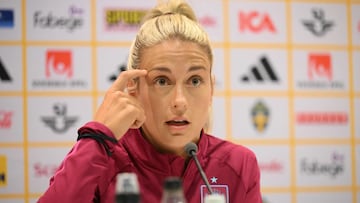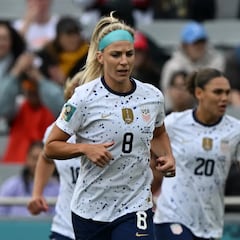Barça’s Alexia Putellas talks of “systematic discrimination against women” in Spain national team
Putellas and Barça teammate Irene Paredes have addressed the chaos surrounding the Women’s World Cup winners ahead of their Nations League campaign.

Alexia Putellas and Irene Paredes have been two of the most influential figures for both Barcelona and Spain over the last few years and, on the eve of their Nations League clash against Sweden in Gothenburg, have had their say on the utter chaos surrounding the recently-crowned Women’s World Cup winners and the RFEF (the Spanish Soccer Federation).
Spain coach Tomé ignores player boycott
New head coach Montse Tomé decided to call up 21 of 39 players who revealed they would be boycotting the national team until changes were made within the RFEF, whose former president Luis Rubiales resigned from his post after kissing striker Jenni Hermoso in the aftermath of the World Cup final win over England.
Under Spain’s Sports Act, players who refuse a call-up could face fines of up €30,000 (almost $32,000) and be banned from featuring for their clubs, which meant they were effectively forced to turn up against their will. Barça duo Mapi Léon and Patri Guijarro, who didn’t play at the World Cup due to their unhappiness with how the team were being treated, withdrew anyway, saying they were not in the right frame of mind to compete.
— Jenn1 Hermos0 (@Jennihermoso) September 21, 2023
Putellas: “The World Cup final was unacceptable”
Putellas on the fight to be heard: “This will be a short press conference, but we have no problem doing another one when we return to Spain. We had been demanding that they listen to us for too long. There has been systematic discrimination against women. We had to fight hard to be heard, which has taken a lot out of us. We care about winning and having people celebrate our victories with us. What happened at the (World Cup) final was unacceptable, and the final straw was the (RFEF) AGM which took place shortly after. We didn’t want to let that go, first for Jenni and then for ourselves. Zero tolerance. Then more things happened. There are statements that explain everything. It has to be made clear that there is a judicial process is ongoing and Jenni is the only victim. The rest of the team are going to be by her side”.
Boycotted players called up: “The roster was announced and then we had a meeting until 5 o’clock in the morning. It wasn’t only players who were involved. We were angry when we got there, we didn’t think we were eligible to be called up. But FIFA has decided that things weren’t done properly. That meeting will be a pivotal moment. I am confident the agreements reached will make our sport and society much better”.
“Zero tolerance” in fight against discrimination
New coach Montse Tomé: “We have never had the power to hire or fire coaches. The players on the roster do not feel comfortable with that suggestion. I want to emphasise that because we always look each other in the eye and are transparent. Both with the current coach and the previous one. Before, it was the same person, we had to take that to the person upstairs”.
Zero tolerance: “We don’t hire or fire anyone, we just condemn what happened. The RFEF belongs to all Spaniards, but there has to be zero tolerance. We ask that anyone who has committed abuse be removed. We don’t have any power, which just want to convey things that can help us improve as soccer players. This topic is not about sports, it goes beyond that. Football is a reflection of our society, which pushed us to continue in pursuit of zero tolerance. We did not want to set a precedent by letting it slide. The RFEF listened to us, although we have needed to have a lot of meetings. The RFEF did not make a statement until a month after everything had happened. That was not right”.
Tʜᴇ ʟᴀsᴛ ᴏɴᴇ 🙌#JugarLucharYGanar I #UWNL pic.twitter.com/iJCVRFMt48
— Selección Española Femenina de Fútbol (@SEFutbolFem) September 21, 2023
Spain captain Paredes: “All we want is respect”
Paredes on the call-ups: “We didn’t want to come, after various conversations we had told them that it wasn’t the right time. We were angry when we got here, and from there we made the decision to stay, although it wasn’t because we really felt comfortable. We believe it is what we have to do so that the agreements reached move forward. The meeting was constructive, agreements were reached to move forward. We know that there are things that will take time. We are aware that changes are happening now”.
Related stories
An (almost) united roster: “All 39 of us are available for selection and practically all of us think the same thing. You have to respect everyone’s opinion. Mapi and Patri, as they said, didn’t want to come back. Those of us who are here have done it because we believe that for changes to happen, we have to do it this way”.
Mood in the camp: “We have been sleeping very little and training for several weeks. The only thing we want is to play soccer and be respected. That hasn’t been possible until now. We have to change things so that we can focus on playing soccer. We haven’t had any support. The CSD (the Spanish government’s National Sports Council) has now got involved, but we’ve felt alone. We’ve told them that they were late to do so. We are tired, but there are things that are being improved and taking place. But we can’t see the light at the end of the tunnel. Now, though, our voices are being heard. There are many women who suffer in a similar way, at work and at home. And we want to stop that from happening forever”.

